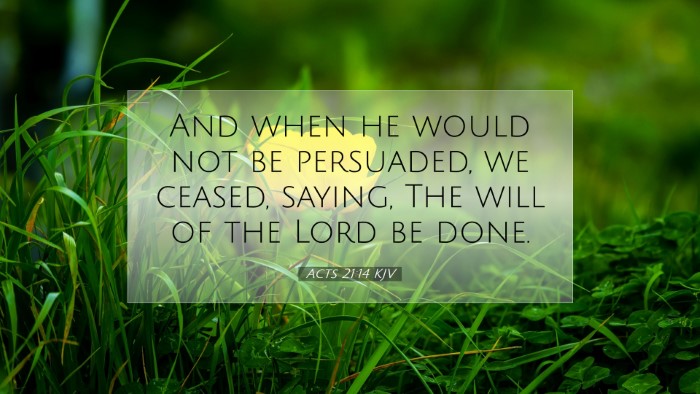Commentary on Acts 21:14
Text of Acts 21:14: "And when he would not be persuaded, we ceased, saying, The will of the Lord be done."
This verse serves as a culmination of the events leading up to Paul's final journey to Jerusalem, encapsulating themes of divine will, human emotion, and the tension between personal desire and divine calling.
Understanding the Context
The context of Acts 21 reveals a critical moment in the Apostle Paul's ministry. He is en route to Jerusalem despite warnings from numerous disciples and prophets about the impending trials he would face. The steadfastness of Paul, in the face of profound personal risk, raises questions of obedience, foresight, and faith.
Commentary Insights
Matthew Henry
Henry emphasizes the unwavering commitment of Paul to fulfill his divine mission irrespective of the challenges ahead. He notes that the collective voices urging Paul to reconsider his journey were genuine, yet Paul’s resolution showcases a higher adherence to the divine purpose. Henry illustrates the tension between human concern and spiritual determination, suggesting that true faith often requires believers to pursue God’s call even in the face of adversity.
Albert Barnes
Barnes analyzes the phrase "we ceased, saying, The will of the Lord be done." He interprets this as a submission to divine sovereignty. The companions of Paul, after trying to dissuade him from going to Jerusalem, resign themselves to the understanding that God’s will ultimately prevails, regardless of their personal desires or fears for Paul's safety. Barnes further emphasizes the importance of seeking God's will, illustrating that believers must be prepared to accept God's plans, even when they conflict with human reasoning.
Adam Clarke
Clarke expands on the emotional dynamic present in this passage. He notes the poignancy with which the friends of Paul express their apprehension. Clarke's analysis points to the powerful emotional bonds within the early Christian community, suggesting that their warnings stemmed not from a lack of faith but from deep love and concern. He reflects on how this dynamic exemplifies the challenge of balancing communal counsel with individual conviction in the pursuit of God’s mission.
Theological Implications
- Divine Sovereignty: This passage highlights the tension between human understanding and divine will. The resolution to accept God's will reflects a deep theological understanding that God’s plans supersede human fears.
- Faithful Obedience: Paul's determination illustrates a model of faithful living—a commitment to pursue God's calling even amidst personal peril.
- Community Dynamics: It reveals how spiritual communities interact when faced with decisions that bear significant consequences. The emotional reality of communal concern is a pivotal aspect of Christian fellowship.
Practical Application
This passage encourages believers to assess their responses to God’s calling. When faced with communal voices that dissent from God’s directive, it is crucial to discern God’s message through prayer and scripture. Pastors, students, and scholars are reminded that discernment often requires a willingness to embrace discomfort for the sake of obedience. Furthermore, fostering community dialogue about God’s will is essential, as it nurtures deeper relationships rooted in love and respect for divine purposes.
Conclusion
Acts 21:14 serves as a profound reminder of the complexities of following God’s will amid personal sacrifice and communal relationships. As we engage with this text, we are invited to reflect on our convictions, our relationships within the Christian community, and our willingness to submit to God’s overarching plan for our lives. The richness of this verse encourages a depth of faith that is both expressive of emotion and rooted in conviction, calling all believers to trust in the paths ordained by God.


